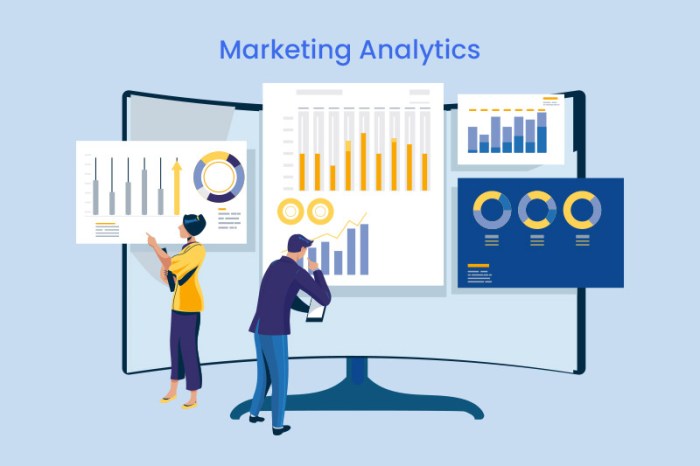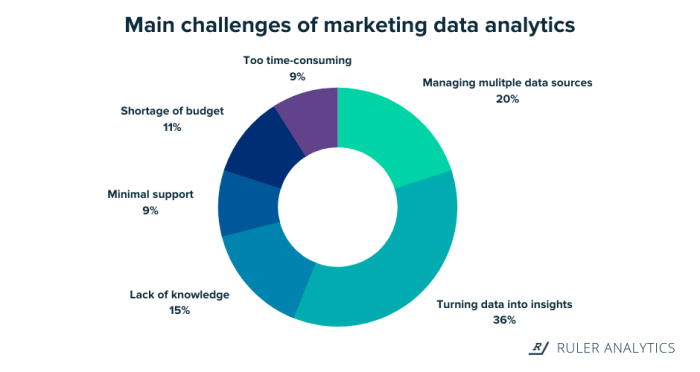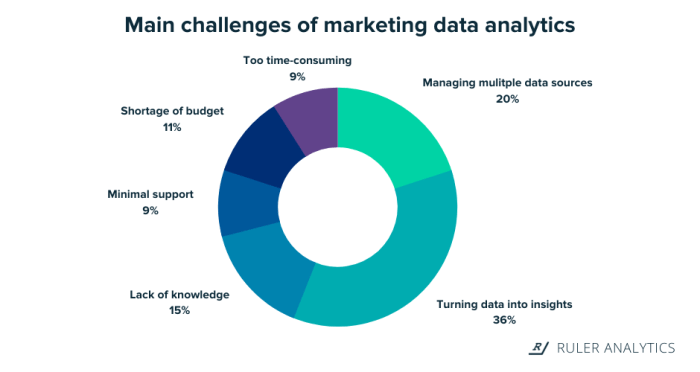Using Data Analytics for Marketing kicks off a game-changing discussion on how businesses can leverage data to enhance their marketing efforts, bringing a fresh perspective to the table.
Importance of Data Analytics in Marketing: Using Data Analytics For Marketing

Data analytics plays a crucial role in revolutionizing marketing strategies by providing valuable insights and trends based on consumer behavior, preferences, and interactions with brands. This data-driven approach enables marketers to make informed decisions, optimize campaigns, and personalize customer experiences.
Successful Marketing Campaigns Driven by Data Analytics
Data analytics has been instrumental in the success of various marketing campaigns, such as:
- Amazon’s personalized product recommendations based on customer purchase history and browsing behavior.
- Netflix’s content suggestions tailored to individual viewing habits and preferences.
- Spotify’s curated playlists and recommendations based on user listening habits and preferences.
Role of Data Analytics in Improving Customer Targeting and Segmentation, Using Data Analytics for Marketing
Data analytics helps marketers improve customer targeting and segmentation by:
- Identifying and understanding customer segments based on demographics, behavior, and preferences.
- Creating personalized marketing messages and offers tailored to specific customer segments.
- Optimizing advertising campaigns to reach the right audience at the right time through the right channels.
Types of Data Analytics Used in Marketing
Data analytics plays a crucial role in helping businesses understand consumer behavior and make informed marketing decisions. There are three main types of data analytics used in marketing: descriptive, predictive, and prescriptive analytics.
Descriptive Analytics
Descriptive analytics involves analyzing past data to understand what has happened in the past. Businesses use this type of analytics to gain insights into historical trends and patterns in consumer behavior. For example, an e-commerce company may use descriptive analytics to track website traffic, sales volume, and customer demographics to identify the most popular products among different age groups.
Predictive Analytics
Predictive analytics focuses on forecasting future trends and behaviors based on historical data. Businesses leverage predictive analytics to anticipate customer preferences and make proactive marketing decisions. For instance, a retail chain may use predictive analytics to forecast sales for upcoming seasons and optimize inventory levels accordingly.
Prescriptive Analytics
Prescriptive analytics goes a step further by recommending actions to optimize marketing strategies based on predictive insights. Businesses use prescriptive analytics to make data-driven decisions on pricing, promotions, and product recommendations. For example, a streaming service provider may use prescriptive analytics to suggest personalized content recommendations to users based on their viewing history.
By combining these three types of data analytics, businesses can gain a comprehensive understanding of consumer behavior and tailor their marketing strategies to drive better results.
Tools and Technologies for Data Analytics in Marketing
Data analytics tools play a crucial role in helping marketers collect, analyze, and interpret data to make informed decisions. By leveraging the right technology, marketers can enhance their strategies and achieve better results.
Popular Data Analytics Tools Used by Marketers:
- Google Analytics: A widely used tool for tracking website traffic, user behavior, and conversions.
- HubSpot: Helps in tracking marketing campaigns, lead generation, and customer interactions.
- Tableau: Enables visualization of data for better insights and decision-making.
- IBM Watson Analytics: Utilizes artificial intelligence to analyze data and provide actionable insights.
How These Tools Help in Marketing:
- Collecting Data: Tools like Google Analytics and HubSpot gather information on website visitors, campaign performance, and customer interactions.
- Analyzing Data: Tableau and IBM Watson Analytics process this data to identify trends, patterns, and key metrics for marketing success.
- Interpreting Data: By visualizing the data and generating reports, marketers can make data-driven decisions to optimize their strategies.
Importance of Leveraging Technology for Marketing Strategies:
Using advanced tools and technologies for data analytics allows marketers to gain deeper insights into consumer behavior, preferences, and market trends. By harnessing the power of data, marketers can personalize campaigns, target the right audience, and measure the impact of their efforts accurately.
Challenges of Implementing Data Analytics in Marketing

Implementing data analytics in marketing can be a game-changer for businesses, but it also comes with its own set of challenges. Let’s explore some common hurdles and ways to overcome them to fully leverage the power of data analytics.
Data Quality and Integration
Ensuring the quality of data used for analytics is crucial for accurate insights. Many businesses struggle with integrating data from various sources, leading to inconsistencies and inaccuracies in the analysis. Companies can overcome this challenge by investing in data quality tools, establishing data governance policies, and conducting regular audits to maintain data integrity.
Skill Gap and Training
Another challenge is the lack of skilled professionals who can effectively analyze and interpret data. Companies can address this by providing training to existing employees or hiring data analytics experts. By investing in continuous learning and development programs, businesses can build a team capable of harnessing the full potential of data analytics.
Data Privacy and Security
With the increasing focus on data privacy regulations, businesses need to ensure that customer data is handled securely and in compliance with laws such as GDPR. Implementing robust data security measures, conducting regular security audits, and being transparent with customers about data usage can help companies build trust and mitigate risks associated with data privacy.
Cost and ROI
Implementing data analytics solutions can be costly, especially for small businesses with limited budgets. Companies can overcome this challenge by starting with smaller, focused projects to demonstrate the value of data analytics and gradually scaling up investments based on the return on investment. By measuring the impact of data analytics on key performance indicators, businesses can justify the costs and optimize their marketing strategies effectively.
Resistance to Change
Resistance to change within the organization can hinder the successful implementation of data analytics in marketing. Companies can overcome this challenge by fostering a culture of data-driven decision-making, involving key stakeholders in the process, and showcasing success stories from early adopters. By demonstrating the tangible benefits of data analytics, businesses can encourage buy-in from employees at all levels and drive organizational transformation.
